The Tyler Method For Successful Triangle Home Study Trading Course by Chris Tyler
$38.00
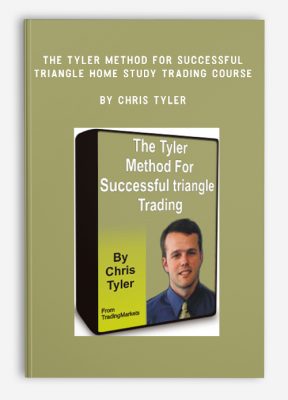
The Tyler Method For Successful Triangle Home Study Trading Course by Chris Tyler
**More information:
Status:
Sale Page
Get The Tyler Method For Successful Triangle Home Study Trading Course at Salaedu.com
Product Description
Let 8-Year Veteran Floor Trader Chris Tyler Teach You How To Make Money With Triangles, Breakouts and Gaps!
New! “The Chris Tyler Trading Series,” A New And Improved Way To Trade Classical Trading Patterns…
Floor Trading Veteran Chris Tyler has released a new interactive training module series teaching you how to successfully trade 3 of the best patterns for traders…Triangles, Breakouts and Gaps.
More importantly, Chris is teaching many new and never before seen ways to take advantage of these classic patterns.
The Chris Tyler Trading Series is broken into 3 separate modules. These modules are:
- Module 1: “The Tyler Method For Successful Triangle Trading”
- Module 2: “My Most Effective Strategies For Trading Breakouts”
- Module 3: “My Favorite Methods For Trading Gaps”
Chris’ first module focuses on triangles. Here is what you will learn:
The Best Strategies For Successful Triangle Trading
The trading world has known for decades that triangles potentially lead to substantial gains. What Chris (and many other traders) has found is that for a triangle breakout to be successful, it must be accompanied by other factors. Chris will teach you, for the first time, specific strategies that combine triangles with a combination of trend, momentum, volatility and more.
These combinations can be immediately applied to your trading. Specifically, Chris teaches them to you in five in-depth sections. These sections are:
1. The Best Intraday Triangles — Do you daytrade? Once correctly identified, intraday triangles provide you with ways of entering both continuation moves within trends and powerful reversals. You will learn the strategies of identifying both situations and entering them at the ideal times.
2. Tyler Momentum Triangles — Tyler Momentum Triangles combine high and low relative strength readings with a specific triangle formation that will give you entries into potentially explosive moves. Once Chris’ criteria for a valid momentum triangle has been met, you will immediately increase the odds that the triangle breakout will be successful.
3. Low ADX Triangle Explosions — Chris has found that some of the best moves occur when you combine low ADX with a specific triangle pattern. Chris will teach you how to identify this pattern and the ADX filters he uses to find these moves.
4. Explosion Triangles – Explosion Triangles enable you to find high-probability triangle setups so that you can focus only on the ones that have the greatest potential for sudden, high-magnitude moves. By applying the rules of this strategy (which Chris adapted from Larry Connors research), you will no longer have to depend strictly on your own subjective judgment of how “good” a triangle looks in a chart.
5. Triangle Reversals –– Some of the biggest moves come from breakouts from triangles that fail. Chris will teach you the one triangle setup that has the highest probability of failing and the potential to lead to the biggest gains as these reversals take place.
Once you master the strategies above, you will be ready to exploit triangles in variety of new and powerful ways. You will know…
- How to recognize triangles that have the very best trading potential. You will learn the specific characteristics you must look for to find the triangles that offer real trading opportunities. This will allow you to focus on the winners and ignore triangles that are destined for failure.
- How to predict the direction of a triangle breakout. Triangles within trends tend to break out in the direction of the trend, but only if the trend is strong enough. You will know when the trend strength criteria is met and anticipate the direction of a triangle breakout.
- How to distinguish between triangles that fail and those that produce fast powerful moves. Using Larry Connors’ volatility research, you will learn how to find the one or two winning triangle trades out of many similar-looking triangles that are likely to fizzle out.
- The best triangles for daytraders. Excellent moves are often triggered when intraday triangles break out. Learn what kinds of patterns work best and what the market must be doing in order for you to trade these moves successfully. On Jan. 3, 2002, KLAC broke out of an intraday symmetrical triangle and was up nearly a point in one hour.
KLAC surges out of an intraday triangle. You will find out why you would take this triangle versus the hundreds of others that occur every day.
- Complete trading strategies and trade management rules for short-term trading. Not only will you learn strategies and trade management for longer-term setups, but you will learn triangle strategies for intraday trades and short-term trades lasting 1 to 7 days. Each strategy will provide you with the specific rules for recognizing optimal setups on the both the long and short side, entering the trade, placing stops, trailing stops, scaling out and exiting. Look at Honeywell (HON) which collapsed from a short-term triangle in September 2002 and declined nearly 20% in 7 days.
HON collapses out of a symmetrical triangle and declines 20% in 7 days. Why did this symmetrical triangle work when many others don’t? Chris will teach you the variables that made this setup a success.
- Are you an intermediate or longer-term trader? Some of the best long-term moves lasting weeks to months begin with breakouts from triangles. You will learn how to enter at the beginning of these moves using the tools and indicators Chris teaches you in his course. One long-term triangle in Gillette (G) broke out in 1993 and didn’t peak out until 1997…a gain of over 279%.
Gillette breaks out of a triangle in 1993 and gains 270% before topping out in 1997.
- How to use triangles to enter strong continuation moves. Short-term triangles can be among the best ways to enter strong trends, but no matter how good the setup looks on a chart, it must meet specific criteria for you to place any trade. Chris will teach you the specific rules for trading short-term triangles in order to maximize your odds of success.
- How to use triangles to identify sharp reversals. There are times when a triangle forms in the midst of a trend. You’re watching it, thinking it’s setting up a continuation in the direction of the trend, but instead it breaks out in the opposite direction and a huge reversal occurs. You will learn the specifics to look for in price pattern, volume, and other indicators that give you a heads-up that a tradable reversal is about to unfold.
In this course, Chris Tyler will take you through the best way to identify the triangle pattern, what elements must be met to form a valid triangle, and other indicators to use for recognizing the best trading opportunities involving them. By the time you finish this module, you should be well on your way to uncovering scores of opportunities from which you can take advantage of this pattern.
Table Of Contents
There are six parts to this course. Here they are in the sequence in which you should tackle them:
Part I: Introduction To Triangles
- Ascending Triangles
- Descending Triangles
- Symmetrical Triangles
Part II: Advanced Real-World Triangles
- Explosion Triangles
- High ADX Triangles
- Low ADX Triangles
- Triangle Reversals
Part III: Intraday Triangles
Part IV: Weekly Triangles For Longer-Term Investors
Part V: Trade Management Using Triangles
- Initial Protective Stops
- Intraday Stops
- Longer-Term Stops
- Trailing Stops
Part VI: Real-World Trading Simulations
- Simulation Vehicle
- Simulation One Broadcom [BRCM]
- Simulation Two Autozone [AZO]
- Simulation Three Capital One Financial [COF]
- Simulation Four Medimmune [MEDI]
- Simulation Five Anadarko Petroleum [APC]
- Simulation Six Sandisk [SNDK]
- Simulation Seven Guidant [GDT]
- Simulation Eight Henry Schein [HSIC]
- Simulation Nine Amgen [AMGN]
- Simulation Ten Starwood Hotels [HOT]
- Simulation Eleven Household International [HI]
- Simulation Twelve Schlumberger [SLB]
- Simulation Thirteen ChevronTexaco [CVX]
- Simulation Fourteen S&P 500 March E-mini Futures [ESH3]
- Simulation Fifteen Lockheed-Martin [LMT]
- Simulation Sixteen eBay [EBAY]
- Simulation Seventeen Paccar [PCAR]
- Simulation Eighteen Autozone [AZO]
- Simulation Nineteen Coca-Cola [KO]
- Simulation Twenty Mercury Interactive [MERQ]
- Simulation Twenty-One Northrop Grumman [NOC]
- Simulation Twenty-Two Manhattan Associates [MANH]
- Simulation Twenty-Three Symantec [SYMC]
- Simulation Twenty-Four S&P 500 March E-mini Futures [ESH3]
- Simulation Twenty-Five S&P 500 Index [SPX]
- Simulation Twenty-Six S&P 500 Index [SPX], Part II
Technical Analysis Day trading
How to understand about technical analysis: Learn about technical analysis
In finance, technical analysis is an analysis methodology for forecasting the direction of prices through the study of past market data, primarily price and volume.
Behavioral economics and quantitative analysis use many of the same tools of technical analysis, which,
being an aspect of active management, stands in contradiction to much of modern portfolio theory.
The efficacy of both technical and fundamental analysis is disputed by the efficient-market hypothesis, which states that stock market prices are essentially unpredictable.
1 review for The Tyler Method For Successful Triangle Home Study Trading Course by Chris Tyler
Add a review Cancel reply
Related products
Forex - Trading & Investment
Forex - Trading & Investment
Forex - Trading & Investment
Amazing Day Trading Ninjatrader Indicator Perfect For Stocks, Futures And Forex
Forex - Trading & Investment
R.S. of Houston Workshop – Top Futures Day Trading Course DVD
Forex - Trading & Investment




![Larry Connors Professional Day Trading for Success Program [ 3 Videos (mp4) + 9 Documents (PDF) + 18 Excel Files + 9 Indicators + 1 Other (HTML) ]](https://tradersoffer.forex/wp-content/uploads/2016/11/Larry-Connors-Professional-Day-Trading-for-Success-Program-220x280.jpg)

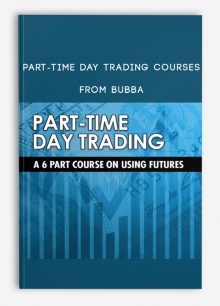
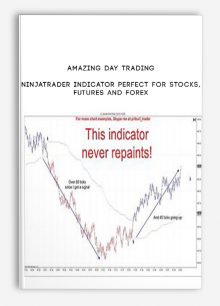
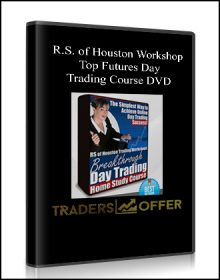
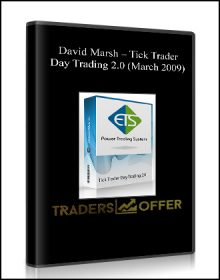
Trevis Trevis –
Welcome to Sala Shop, we are here to provide everything to learn and improve this life…encourage you to check clearly the course